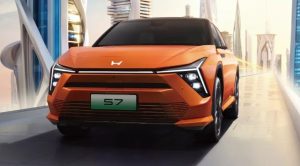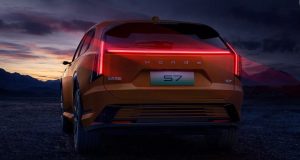Honda Rolls Out All Electric SUV S7
Japanese car makers, except Nissan, were among the auto manufacturers famous for not adopting sustainable development in the global car market. However, with Chinese carmakers making strides in transferring green technology to the wheels, their Japanese peers started losing their reluctance towards sustainable practices.
Japanese companies famous for bringing affordable offerings, in terms of wheels, to the local market have also started targeting the world’s largest Chinese market. For instance, a week back, Toyota, known for its stern support towards hybrids, also launched its electric SUV bZ3X in China at ¥109,800, approximately $15000. And surprisingly, 10,000 EVs were booked in the first hour.
Honda’s Electric SUV S7
Honda has introduced its exclusive all-electric SUV, the S7, which is tailored specifically for the Chinese market. Developed in collaboration with Dongfeng, the S7 aims to rival popular models such as the Tesla Model Y, Onvo L60, and Zeekr 7X.

Built on a specialized electric vehicle platform, the S7 is powered by an 89.8 kWh battery. The entry-level version features a single electric motor generating 268 horsepower (200 kW), driving the rear wheels. While not designed for high performance, this setup provides ample power for daily use, with an estimated range of 404 miles (650 km) under the Chinese CLTC testing standards.
The interior of the S7 emphasizes advanced technology and premium comfort. A 12.8-inch vertical touchscreen dominates the dashboard, complemented by a 9.9-inch digital driver display. Traditional side mirrors have been replaced with camera-based systems, with screens integrated into the doors for a futuristic touch.

Adding to the sense of spaciousness, the cabin includes dual glass roof panels, while audio enthusiasts can upgrade to a 16-speaker Bose sound system, complete with speakers embedded in the front headrests.
Pricing
Honda’s new S7 electric SUV, with a starting price of ¥259,900 ($35,800) for the single-motor version, aims to challenge established rivals like the Tesla Model Y, Onvo L60, and Zeekr 7X. The dual-motor variant begins at ¥309,900 ($42,840).



Here is another insight into this story. Something worth mentioning. Honda has two EV factories in china. One in collaboration with GAC and the other with Dongfeng and it is using Chines tech to make its EVs. Now its in the process of talks with Huawei for its self driving tech…
*https://www.arenaev.com/hondas_new_ev_brand_ye_will_use_huaweis_selfdriving_tech-news-4285.php
Also, regarding the pricing of this S7 EV “from Honda”…
*https://carnewschina.com/2025/03/06/honda-s7-electric-suv-launched-in-china-for-35840-usd-with-up-to-469-hp/
The article reads:
“The Japanese crossover is a bit cheaper than its American rival in the Middle Kingdom. However, the Honda S7 has a lot of strong rivals from Chinese brands, including 800V-platform-based Zeekr 7X, Xpeng G6, and BYD Sealion 07. What is more, these models are seemingly cheaper than the Japanese-branded car. The Tesla Model Y copes with the competition from the Chinese models because of the brand’s halo. However, Honda hasn’t got the same advantage in the field of electric cars. So, it will be problematic for the S7 to turn into a hot seller in China.”
Price-wise. Honda has to do much better. Unlike in Pakistan, coasting on their brand name alone no longer works in China as the Chinese consumers prefer their local brands more.
*https://cleantechnica.com/2025/03/08/honda-toyota-introduce-new-battery-electric-suvs-in-china/
The article reads:
“There’s no more coasting on the strength of their name recognition. It’s put up or shut up time for both companies (Honda and Toyota) and both have responded with competitive offerings in their respective classes. Now the sales totals will tell the tale. It’s go big or go home time for both companies.”
“The one thing NOT in their favor is that Chinese customers are now showing a clear preference for cars manufactured by Chinese companies — a headwind that has affected sales of all cars that carry the branding of foreign legacy manufacturers like Porsche, Mercedes, Volkswagen, Renault, and others. If the new offerings from Honda and Toyota are a swing and a miss in the marketplace, both companies may no longer be able to maintain a presence in China.”